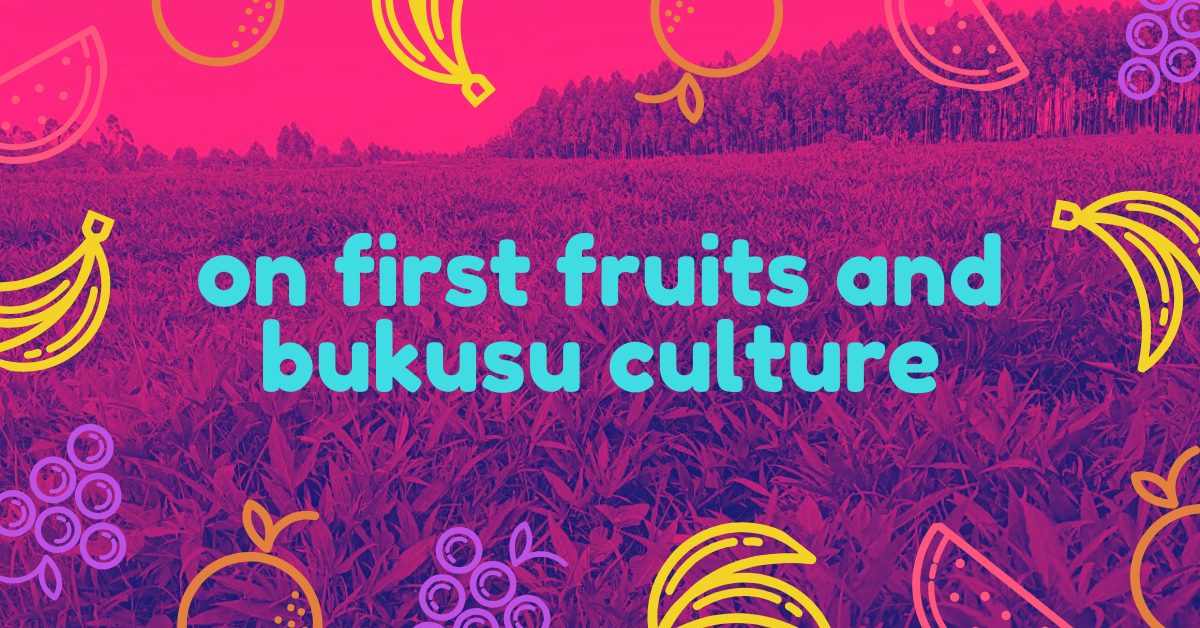Be it in African culture, Christianity or many other cultures of the world, the first fruits of a virgin land hold special importance. Join us as we learn special Lubukusu names given to various farm produce that are first fruits.
The other day I had a chance of enjoying a bountiful harvest from my farm. The land I had tilled had been not utilized for eons. It’s a land that had been passed on from my husband’s grandfather to my father in-law and then now to us. All this while, no one had ever found the energy to till it. But not yours truly. Not this Bukusu girl brought up by the ethos of the Bukusu proverb: Embako sebea ta! Meaning, the jembe does not lie.
Our little piece of inheritance had all along been used as a playground. When time came, I asked my farm hand to till it. Since this was virgin land, we had to till it thrice for it to be ready for use. Farmers among us know that it is convention in western Kenya to till the land twice before planting. The first till is to break the land and turn over the surface vegetation to kill them. The second cultivation is a harrow meant to make the soil light and airy, thus perfect for germination.
Three times the work
Therefore, having to do it three times meant more work and spiraling costs. However, the extra work was all in stride. The satisfaction of enjoying the first fruits from land is one I, and many for that matter, would go out on a limb for.
Thus, with this goal on sight, I had made up my mind to plant some delicacies: a plethora of Luhya traditional vegetables, sweet potatoes and bananas. I set out with my plan as usual, for my husband is this hardworking guy who takes care of everything else except the farm. He rarely sets foot on the farm.
Of nandeti we tosi and how first fruits helped foster the spirit of mulembe
The Bukusu nickname such a person as Nandeti we tosi. Nandeti we tosi is this insect that loves the mud. Actually, I have never seen it thrive elsewhere except for where there’s mud. But boy, the insect is smooth and shiny. Despite being in the dirt, no trace of mud sticks on ruining its shiny coat.
Back to my story, with the blessing of my nandeti we tosi, I planted my potatoes, vegetables and bananas. After two months, the first fruits were ripe. I got so much chisaga, likhubi and the like that the vegetables overwhelmed us. Since I had been advised not to sell, I kept sending my children to different neighbors’ homes to distribute them as gifts. My father in law said gifting kith, kin and kindred with the first fruits was the Luhya way. For it spread mulembe, blessed the land and the generations that would live off it.
Then, four and half months in, the sweet potatoes came flowing. At any given time, we had so many kamapwoni in our house. My husband used to joke that he was good to run for office for he now had enough to feed hundreds of adults for weeks. With this second harvest, I was at liberty to sell. That said, so bountiful was the harvest that even gifting them away would have been counterproductive, appearing as a show off.

Therefore, market women kept coming to the farm every Saturday morning. It made me a descent Ksh 10,000 on a fine day. This made me not only proud but grateful to Wele for having granting us the grace and life to eat the first fruits from the land we inherited from our grandfather and father in law.
First fruits by any other name but; Kamapwoni kamachoolela, chinyenyi chikhulisilia, chinyenyi chikhalisilia and kamatore kamulo
In Lubukusu we have different names given to various first fruits. If you were to refer to the sweet potatoes first fruits you would call them kamapwoni kamachoolela. The vegetables would on the other hand be referred to as chinyenyi chikhulisilia and chinyenyi chikhalisilia.
For the bananas that we we still await to mature so that we can make some katogo, we refer to them as kamatore kamulo. If I had planted some pepper, they would have been referred to as embuko. What a blessing to be able to enjoy first fruits! Pure bliss
Learn Bukusu
- How to say ‘come and close the gate’ in Bukusu

- Meaning of nyanga ya mabasa in Bukusu

- The owl in Bukusu is Esikhikhi: A lick at curious associations and myths about the owl in Bukusu culture

- How do we say am amazed in Bukusu

- Names of 10 common rodents in Bukusu language

- How to say good morning in Bukusu

- Spice up your Bukusu: Meaning of enje chelechenje

- How to say I miss you in Bukusu language

- Common English pronouns in Bukusu language

Bukusu language or Lubukusu is the tongue of Babukusu, the largest of the 18 houses of mulembe. Learn how to speak Bukusu language through our free lessons in Bukusu language; our stories on Bukusu culture that harness the richness of Lubukusu in their narrative; our continuous search for the meaning of different Bukusu proverbs and sayings; and if your Lubukusu is already good enough, sharpen and challenge yourself with our new blog sibukusu that covers everything Bukusu in the purest Lubukusu.
Get started with our mega post: 130+ common Bukusu words and phrases their meaning, translation and pronunciation.

